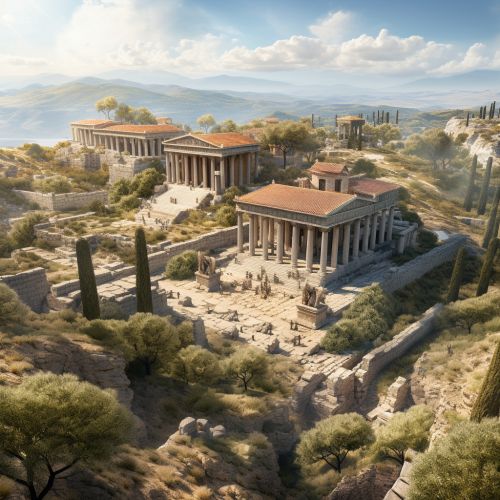Ancient Greeks
Introduction
The Ancient Greeks were a civilization that emerged in the 8th century BC and lasted until the end of antiquity, around 600 AD. They were known for their significant contributions to art, architecture, philosophy, politics, and science, which have had a lasting impact on Western civilization.
Geography and Early Settlements
The Ancient Greeks lived primarily in the region now known as Greece, which includes the mainland and numerous islands in the Aegean Sea. The geography of Greece, with its rugged mountains and indented coastline, played a significant role in shaping the political and economic life of Ancient Greek society. The earliest known settlements, such as those at Mycenae and Knossos, date back to the Bronze Age and were characterized by their complex architecture and rich material culture.


Society and Culture
Ancient Greek society was divided into various classes, including free citizens, metics (foreigners living in Greece), and slaves. The social structure was deeply intertwined with the political system, especially in city-states like Athens and Sparta, where citizenship status determined one's level of political participation.
Greek culture was characterized by a strong emphasis on education and the arts. The Greeks developed a rich literary tradition, with notable authors such as Homer, Hesiod, and Sophocles. They also made significant advancements in visual arts, producing iconic sculptures, pottery, and architecture.
Political Systems
The Ancient Greeks are credited with the invention of democracy, which was first implemented in Athens in the 5th century BC. However, not all Greek city-states were democracies. Some, like Sparta, were oligarchies, ruled by a small group of elites. Others, like the kingdom of Macedonia, were monarchies.
Philosophy and Science
The Ancient Greeks made significant contributions to philosophy and science. Philosophers like Socrates, Plato, and Aristotle laid the foundations for Western philosophy, exploring topics such as ethics, metaphysics, and political theory. In science, figures like Hippocrates in medicine, Euclid in mathematics, and Ptolemy in astronomy made groundbreaking discoveries that would shape these fields for centuries to come.
Religion
Religion played a central role in Ancient Greek life. The Greeks practiced a polytheistic religion, worshipping a pantheon of gods and goddesses, each with their own distinct personalities and domains. Major deities included Zeus, the king of the gods; Athena, the goddess of wisdom; and Apollo, the god of music and prophecy.
Legacy
The legacy of Ancient Greece is profound, influencing various aspects of Western civilization. Greek philosophy and science laid the groundwork for Western intellectual thought, while Greek art and architecture have had a lasting impact on Western aesthetic standards. The concept of democracy, first developed in Athens, remains a cornerstone of political systems worldwide.
